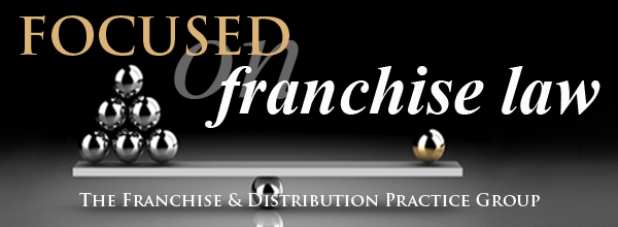Franchise 101: Arbitr-“all”; and 31 Flavors of Fees (or just one)

bkurtz@lewitthackman.com
dgurnick@lewitthackman.com
tgrinblat@lewitthackman.com
swolf@lewitthackman.com
msoroky@lewitthackman.com
kwallman@lewitthackman.com
tvernon@lewitthackman.com
OCTOBER 2017
40th Annual ABA Forum on Franchising
 Our Franchise & Distribution Practice Group, including three California Bar Certified Specialists (Barry Kurtz, Tal Grinblat and David Gurnick), three associates (Samuel C. Wolf, Matthew J. Soroky and Katherine L. Wallman), and four paralegals (Caitlyn Dillon, Marianne Toghia, Kelly D’Angelo and Peggy Karavanich [not depicted below]) attended the American Bar Association’s Forum on Franchising in California’s Palm Desert. This three day conference consists of educational programs and networking events designed to keep legal professionals up to date on the latest transaction and litigation concerns affecting both franchisor and franchisee clients.
Our Franchise & Distribution Practice Group, including three California Bar Certified Specialists (Barry Kurtz, Tal Grinblat and David Gurnick), three associates (Samuel C. Wolf, Matthew J. Soroky and Katherine L. Wallman), and four paralegals (Caitlyn Dillon, Marianne Toghia, Kelly D’Angelo and Peggy Karavanich [not depicted below]) attended the American Bar Association’s Forum on Franchising in California’s Palm Desert. This three day conference consists of educational programs and networking events designed to keep legal professionals up to date on the latest transaction and litigation concerns affecting both franchisor and franchisee clients.

David Gurnick in Corporate Counsel
When Uber acquired Otto, the autonomous vehicle program headed up by former Google engineer Anthony Levandowski, eyebrows were raised and a lawsuit was filed. Now, more questions come to the fore, this time regarding due diligence by Uber’s chief legal officer. Read David Gurnick’s quotes on this topic in:
Should Uber’s Salle Yoo Have Taken Earlier Look at Critical Due Diligence Report?
FRANCHISOR 101: Arbitr-“all”

A federal court in New Jersey granted a franchisor’s motion to compel arbitration of disputes involving seven frozen yogurt franchises, even though the claims were subject to different arbitration provisions in different agreements, providing for different arbitral organizations and procedures.
An insolvent franchisee sought to liquidate assets. Each franchise agreement included arbitration and mediation clauses. The franchisee brought a claim against its franchisor for fraud, breach of contract, unjust enrichment and violation of the New Jersey franchise law. The franchisee argued the court should not compel arbitration because the various agreements’ arbitration provisions had different language, were in conflict, and did not specify a uniform method of arbitration.
Two franchise agreements provided for arbitration according to rules of the American Arbitration Association. The other agreements called for arbitration with any reputable arbitration services, specifically noting CPR and JAMS.
The court found the various clauses did not require separate arbitrations. The court concluded that while the provisions differed on rules governing arbitration, the differences were minor and did not preclude compelling arbitration. The court also found that the parties could comply with all the provisions by, for example, retaining as arbitrator a neutral, former judge who was willing to proceed according to American Arbitration Association rules.
While speed, cost, and privacy may no longer be persuasive grounds to support inclusion of arbitration provisions in franchise agreements, arbitration often provides control over the location of the dispute, lowers the damages that can be recovered by franchisees, and limits the number of parties to the action. Franchisors often have a tactical advantage if the franchise agreement contains an arbitration provision, particularly in disputes against multi-unit franchisees that own units spread across different jurisdictions.
The nature and extent of these characteristics of arbitration usually advance the business and legal interests of the franchisor.
See Mitnick v. Yogurtland Franchising, Inc., 2017 WL 3503324 (D.N.J. Aug. 16, 2017).
FRANCHISEE 101:
Thirty-one Flavors of Fees (Or Just One)

Baskin-Robbins charges a dairy supplier a so-called “commercial factor” fee for the right to make and sell Baskin-Robbins proprietary ice cream to franchisees. The supplier’s pricing to franchisees includes an amount equal to this fee. In Association of Independent BR Franchise Owners v. Baskin-Robbins Franchising, LLC, a franchisee association asked a federal court to rule this price component was an unauthorized fee. But the court ruled for Baskin-Robbins, holding that the charge to franchisees was permissible.
The court found that Baskin-Robbins franchisees pay a “price” for products they buy, not a “fee.” Relying on dictionary definitions of “fee” and “price,” and noting that Baskin-Robbins franchisees pay a single amount to the supplier for products, the court found that while the commercial factor was a fee the franchisor charged its supplier for the privilege of selling ice cream under Baskin-Robbins’s name, the supplier simply charged franchisees for the products and that was not a fee.
The court also considered whether Baskin’s franchise agreement prohibited the supplier from charging a pass-through cost to franchisees. The court found that the relevant provisions in the franchise agreement required franchisees to buy products from Baskin-Robbins’ designated supplier, at the supplier’s price. The court noted that pass-through costs and charges along the supply chain are standard industry practice. The court added that even if it found ambiguity in the franchise agreement, the parties’ course of dealing showed that a supplier passing along its cost to franchisees was not prohibited. The franchisees paid for many years without objection and Baskin-Robbins disclosure document noted that the franchisor received revenue from franchisees’ purchases of products from designated suppliers.
Some franchisors are creative in finding ways to collect monies from franchisees beyond straight royalties and advertising fees. Prospective franchisees should carefully review the disclosure document, talk with other franchisees and learn about practices in their system, to be informed about each source of revenue, and both direct and indirect charges, their franchisor imposes.
Read: Association of Independent BR Franchise Owners v. Baskin-Robbins Franchising, LLC
